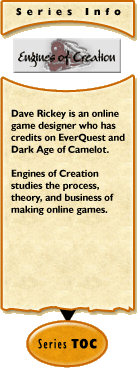
Sympathetic Fallaciesby Dave Rickey Until the last century, human beings lived their lives immersed in stories. Before the advent of modern mass entertainment, our cultural heritage was defined by stories that had passed through generations. The fantasy settings that have filtered through Tolkien and Gygax to become the cliches we build games around were once the pieces of pre-medieval European religions. Like all religions, they were attempts to account for the otherwise inexplicable attributes of the world they found around them. Unlike animals, perhaps as the defining attribute that makes us sentient creatures rather than just clever monkeys, we look for the underlying causes of the things we see around us. We cannot see something without wanting to know why it is the way it is. We seem to be hard-wired for making causal connections. Where we cannot absolutely know what the explanation for something is, we'll invent an explanation. Why does the sun cross the sky? Why does winter come every year? Why does the ground in those mountains smoke and shake? Our ancestors divided the world into a few simple categories: People, human beings not of our tribe (who were *not* people), animals, and spirits. The boundaries of those categories could get pretty fuzzy, and mythologies formed as people tried to explain the whys of the world around them in these terms. This tradition of explaining the world through stories pre-dates even the concept of writing, and is part of the evolution that made us human. We *expect* there to be stories behind the things we see, whether those stories are a matter of cultural tradition, or physics and written history. And this highlights one of the major failings of our online worlds: The thinness of their storied explanations. At best, our stories are cliches, repeated with slight variations not only between worlds, but within them, over and over. Most of the time, the explanation for anything the players see is simply that a tired world-builder squiggled his mouse in a few semi-random ways. In the extremely large worlds that are becoming the standard, nearly the entire world is simply an expression of random numbers, sterile and soulless. We want to find meaning in our surroundings, we *need* to do so, even when it isn't there. The players try to make up for this, and create their own stories, their own explanations, and their own mythology. But these have no staying power, and are constantly in danger of being rendered irrelevant by the hand of the operators. This is the real promise of "Player Generated Content", if our worlds are going to continue to grow then one of three things has to happen: Budgets have to increase by an order of magnitude (into the $100M+ range), a major breakthrough in algorithmic world building has to happen (of the same nature and approximate difficulty as computers writing fiction novels), or we have to find a way to translate some of those thousands of man-years the players spend interacting with the worlds into generating meaningful and compelling environments. In his keynote for last year's Austin Game Conference, Raph Koster made the argument that because of the way that we perceive "fun", the long-argued division between "Art" and "Games" does not actually exist. Here I would seem to be arguing the same thing from a different direction, but I think there's an important distinction: A work of art is a message from the artist to the audience. A game, on the other hand, is an experience the audience creates for itself. A game could potentially *contain* art (not just the trivial example of artwork embedded into the world, but in the larger sense of containing elements intended to communicate a message), but the game itself is fundamentally something different, and an environment intended to acknowledge and absorb the influences of players while evolving in its own right would be something else again entirely.
[ <— #17: Pareto Optimism | #19: Fun-damentals —> ]
|
